
Six weeks ago Brighton and Hove City Council moved nearly 300 street sleepers and sofa-surfers into safe accommodation in empty hotels.
Every day since, an army of volunteers – now 80-strong – has worked from 6.30am to source, prepare, cook and deliver meals to the city’s homeless.
Freelance reporter Joel Adams spent a day with volunteers to see how the people of Brighton and Hove have come together to look after the most vulnerable among us in a time of need.
“It’s seven days a week. I’ve worked seven days since this began in April. Everyone needs feeding, seven days a week, so…”
Juliette Bidwell indicated the rows of tables in front of her, covered so densely with brown paper sandwich bags that the colour of the tabletop was unknowable.
She and her team of volunteers work for four or five hours each morning, preparing the breakfast-lunch-and-snack bags which will sustain the city’s homeless before and after their hot meal arrives in the afternoon.
Like many of the 80 or so volunteers involved in the effort, Juliette insisted she doesn’t deserve much credit – in her case because she is contracted by the council.
But that only means she is being entrusted with the meagre food budget, not being compensated for her time.
She said: “It started with 40 or so. Now it’s about 300.
“We respond to the numbers that we’re given. It’s a lovely project to be involved in.”
She has leased and run the Garden Café in St Ann’s Well Gardens in Hove for 15 years – and for the past several years has provided hot meals for SWEP, the council’s emergency bad weather night shelter service for street sleepers.
The core SWEP (severe weather emergency protocol) team, both public sector and volunteers, have been critical to this extraordinary new effort to feed the city’s homeless population.

On Friday 27 March, the government ordered English councils to provide accommodation to the homeless due to the coronavirus lockdown – and in Brighton and Hove the council found rooms in the city’s empty hotels.
The official street count for homeless in the city fluctuates between 80 and 100, although charity workers have long suspected that the true number was twice that.
Once sofa-surfers and those who found themselves temporarily without accommodation were added to street sleepers – known and unknown – the true number was revealed to be around 280.
Feeding those 280 people twice a day, every day – including one hot meal – has required ingenuity, determination and thousands of hours of free labour.
But as usual in Brighton it has been willingly given.
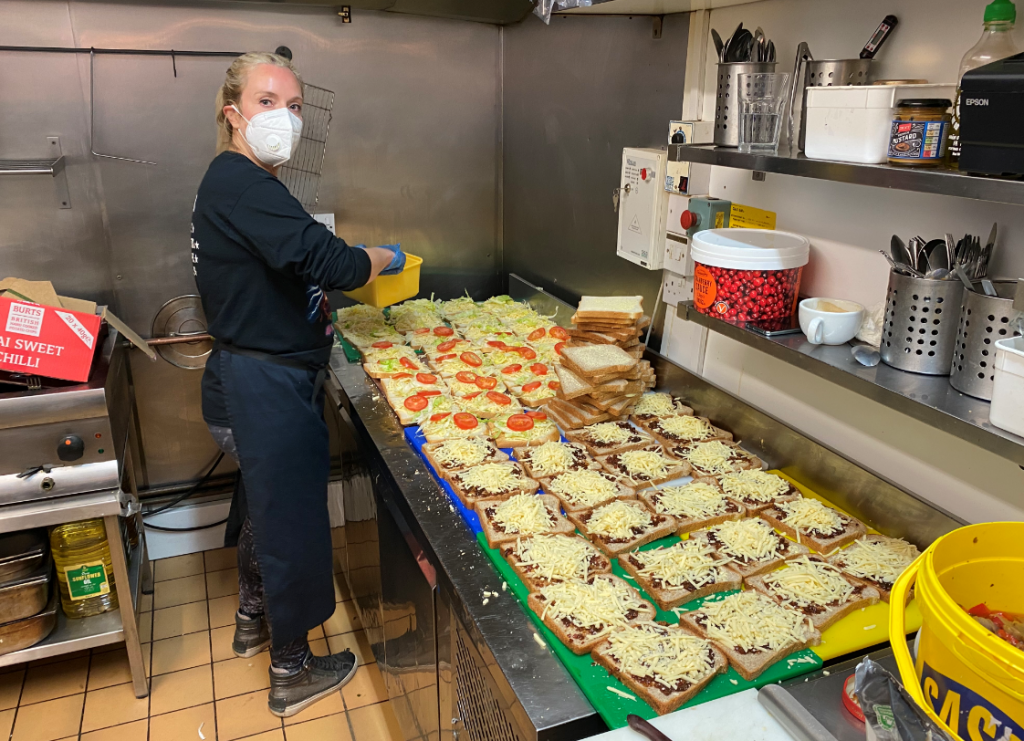
Juliette is joined on the early shift in the café by team-mates including Kate Packham, 45, an events manager who finds herself “very out of work”, volunteer Kat Blunden and 27-year-old Bex Marchant, an employee of Juliette’s who is currently furloughed and volunteers two mornings a week.
Bex said: “It’s nice to be here – it’s just a lovely thing to get involved in. It’s so nice to be a part of something like this – to help.”
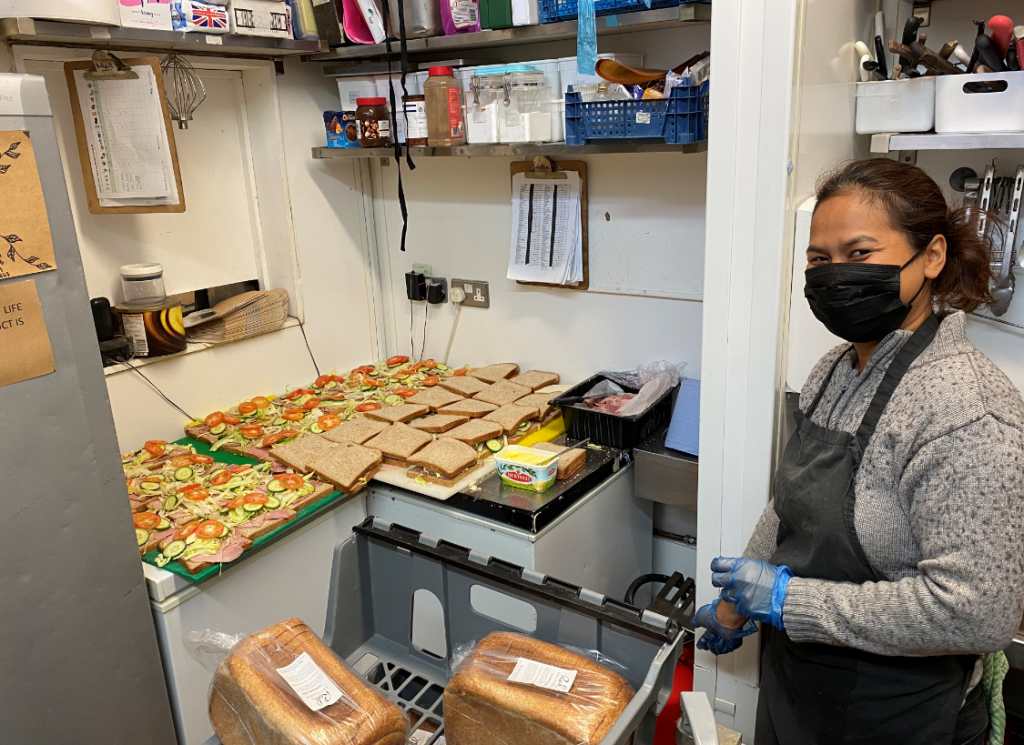
Each morning the café team receives a briefing document: how many meals, what dietary requirements, which hotels.
The production of that list – updated and amended daily – is a significant achievement in its own right. It is a collaboration between the St Mungo’s staff, who guide street sleepers to hotels and find berths for the newly homeless, and council staff who ensure they have a record of each person’s details and needs, including any allergies or dietary requirements.
Between 6.30am and 9am the café team make sandwiches and add them to the snack bags they prepared the previous afternoon, careful to write on each bag which meal is vegetarian, which vegan, which halal and which is suitable for those with which allergies.
Each bag contains a handmade sandwich, a drink, a packet of crisps, a piece of fruit and at least two snacks. Not bad for just £4 a meal (paid by the council from a ringfenced covid-19 fund) for ingredients and labour.
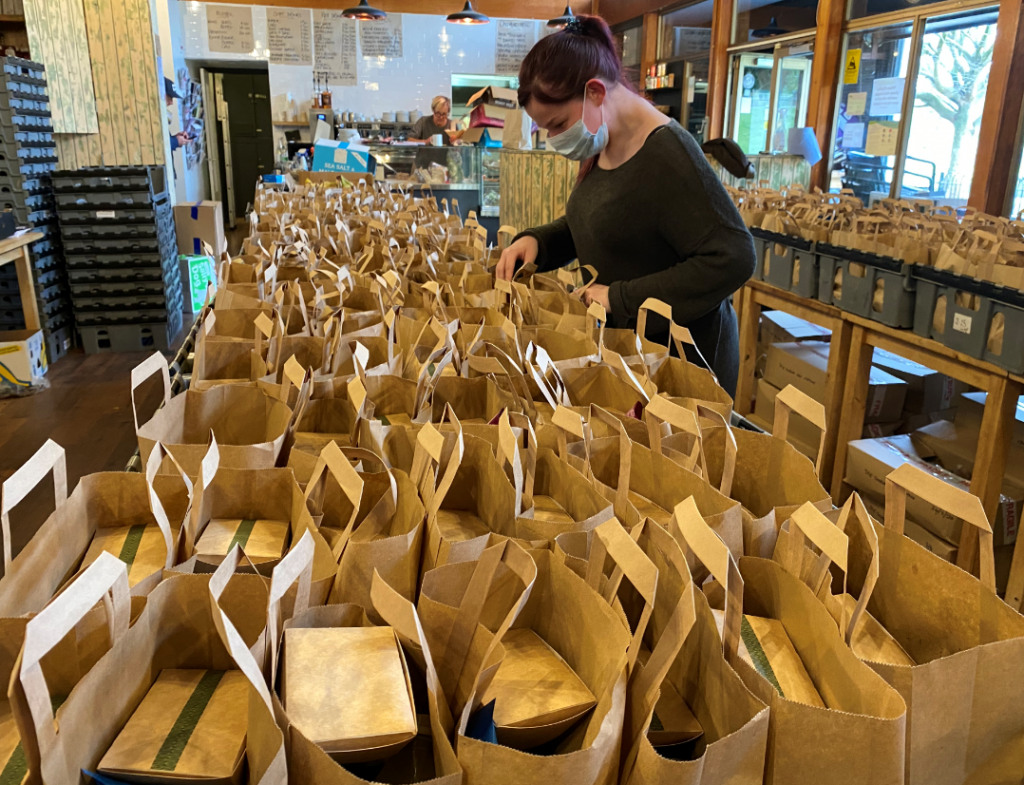
Around 9am, different volunteers arrive to transport trays of meal bags from the café to the group’s distribution hub, the Baptist Church in Holland Road, Hove.
From there, volunteer drivers deliver them – careful to include the right special meals – to the dozen city centre hotels currently playing host to Brighton’s homeless residents.
Freelance events manager Asta Sabaliauskaite is volunteer co-ordinator at the hub, having been volunteering since the start. She plans rotas and “looks after” her 80 volunteers in an effort to learn enough to improve homeless care long term.
She said: “I’m working full time because I care a lot about the homeless sector and I’m so critical of what’s happening.
“I wanted to see the system and come up with an idea for what to do after this – how to help more people and have more being done to make a difference, basically.”
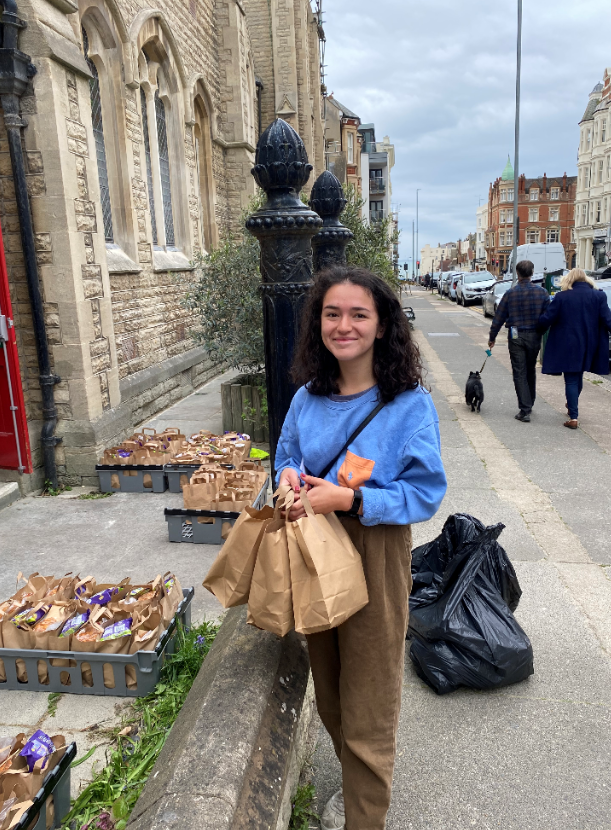
Parishioners are on hand too. Lorry driver Brad De Laine, currently furloughed, said: “I’m ex-army and one of the church leaders saw I was good at co-ordinating stuff, so my job is to look after and organise the individuals who are driving today.”
Bristol University student Victoria Mery, 19, had planned to go travelling this spring but instead is among those who arrive in their cars at around 9.30am to distribute the meals from the hub to the hotels.
She said: “I volunteer three mornings a week, to two hotels. You take the right meals and the right number of dietary requirements – like people who don’t eat pork for instance – and you give them to the co-ordinator.
“It doesn’t take long, maybe two hours. It’s just a nice thing to do”
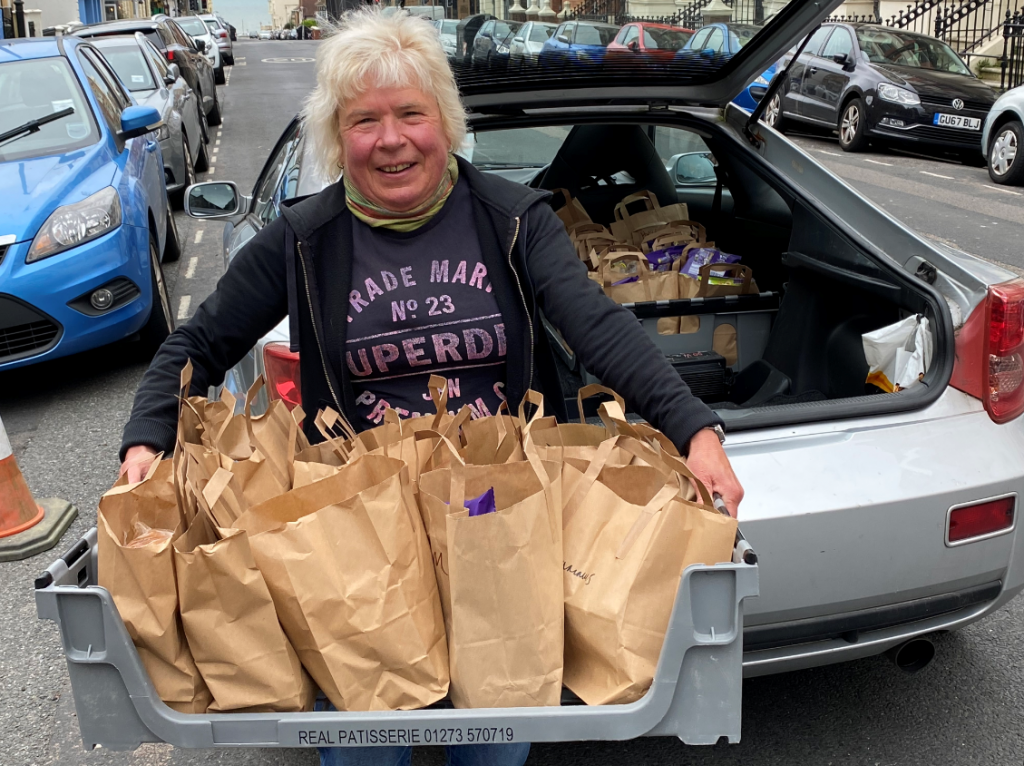
Amanda Pearce, 58, made several trips to and from the church to deliver all 48 of the meals on her “patch” last weekend. Her tirelessness has earned her the nickname “pocket rocket” among fellow volunteers.
Asked why she had spent Sunday morning criss-crossing the city centre in her Toyota Celica rather than having a lie-in, she said: “I just do it to put something in to the city – to put something back.”
The meal bags arrive with their recipients around mid-morning, handed over to co-ordinators in the hotels or to the security teams in place at each location.
Octavia Zelyut, a security guard at one of the hotels, said: “It has definitely helped.
“People who have been fed are calmer and more lucid. It really keeps morale up – especially when Garry brings in chocolate!”

Volunteer Garry Morrill – who has played a leading role in sourcing food for SWEP for more than four years – has done as much as anyone to scale up the operation which was providing 40 hot meals a night to the current 600-meal-a-day behemoth.
The former commodities trader now volunteers seven days a week sourcing food and snacks, including unlikely coups like thousands of Costa Coffee chocolate brownies, 5,000 Easter eggs (which are being shared with other charities) and one memorable delivery of several pallets of rice pudding.
He said: “Our philosophy is, if you wouldn’t eat it yourself, it doesn’t go in.
“This is really good food we’re giving people. I’m very proud of what we’re providing – but also, for instance, that the people who are vegan can rely on getting a handmade vegan meal. It’s a personal service.
“But all the thanks goes to the volunteers. They’re just incredible. They work so hard and such long hours and they have just risen to every single challenge.”

With the meal bags delivered, the team at the Garden Café prep tomorrow’s bags with any non-refrigerated items, clean their kitchen and head home for the day at around 11am.
But across town a different team – at the Ruby in Coldean Lane – have been arriving since 10.30am. And by midday the kitchen is buzzing a socially distanced buzz.
Tom Cooper, 28, usually works as head chef at the Prince George, in Trafalgar Street, Brighton, but now he doesn’t have any customers to feed.
He and out-of-work freelance chef Ricky Gilbanks, 27, had to manage the huge workload between them for the first week but now have a team of almost 20 fellow volunteers to draw upon.
Tom said: “It’s the same set up but it’s trying to bulk everything up ten times more than you’re used to. But everyone seems very happy with the food. The feedback has been good.”
Stir crazy
Ricky added: “I was getting a bit stir crazy to be honest. It’s good to get out of the house and it’s all for the cause.”
Making sure to adhere to special dietary requirements hasn’t fazed experienced chefs.
“We have a couple of halal, so they can’t have non-halal meat,” Ricky said, “but if we’ve got one vegan and 20 vegetarian, we might do 21 vegan meals. To be honest a lot of that we’re all used to dealing with in our normal job.”
The greater challenge can be making the best of whatever food can be sourced.
Volunteer sous chefs have been asked to spend hours opening tin after tiny consumer-sized tin of chopped tomatoes for a spaghetti bolognese when usually kitchens use five or ten-litre tubs.
Tom recently had to invent a recipe for sausage stew to make the most of a consignment of chipolatas – and in the week when 4,500 boiled shelled eggs arrived unexpectedly, the city’s homeless residents enjoyed nicoise salad and egg curry.
Big job
On Sundays everyone gets a full roast dinner with all the trimmings – last weekend it was roast gammon with roast potatoes, sweet potatoes, carrots, braised red cabbage and gravy (and delicious it was, too!)
Even for Lindsey Nicol, 43, an out-of-work freelance chef used to catering large events, it is a big job.
“Three hundred is a lot. Even weddings are only about 150. But actually it’s nice to be able to have the time to do something to help for a change.
“And it’s not all selfless – I get to get out of the house, do something and have some company.”
The council produces daily lists for the Ruby too, with numbers and dietary requirements, and those lists also brief the afternoon team on how many patch runs they will need and how many meals will go to each location.
Each insulated box for each hotel is marked with any special contents on the exterior and special meal trays inside are labelled. The boxes are picked up and taken to the hub in Holland Road where the afternoon’s volunteers are waiting to distribute them around the city.
The meals arrive with their recipients between 3pm and 4pm – and back in Coldean, once tomorrow’s prep is done, the kitchen staff clock off between 4pm and 6pm.
Great bunch
The “hot meals” team is led by Prince George franchisee Edd Heller – another 18-month stalwart of cooking hot meals for SWEP – and his chefs, while publican Ben Murray works long days behind the scenes sourcing food.
In addition to 300 hot meals a day for the homeless, they also whip up 150 salads for NHS staff and vulnerable elderly residents.
Edd said: “It’s a really really great bunch of people who’ve come together to make this happen. Everyone has really pulled together.”
“What we’ve done now will hopefully stay with us long past lockdown. I really believe this is sustainable – it just needs people who have the determination.
“We’ve been throwing money at homelessness for decades and it’s as bad as ever. Maybe we’ve been doing it wrong. Let’s house people, and feed people and then work through their problems.
“No matter if we’re rich or poor, we all have to eat. Maybe it’s the chef in me but if you feed them, and pay attention to what you’re feeding them, then they can engage with you.”
Promising signs
The Ruby’s owner Anant Suchak agreed: “This pub is a community facility – and at a time like this you have to think of the community as being bigger than the neighbourhood, or Coldean. It’s the whole city.
“I think the council has done a good job but the people have got to do it too and I think businesses have to have a role to play. Anything for the homeless. You just think, ‘fine.’”
It is early days but there are promising signs. Volunteers say meals are rated “tasty”, “great” and “pukka” – and security staff at the hotels report as positive an atmosphere as one could hope for. The project may even be winning hearts and minds.
Mark Woodland, 50, has been sleeping rough for 35 years, eight of them in Hove.
His most recent job was as a painter and decorator in 2000 but he left after a disagreement with his foreman. Before that he was a jobbing labourer.
Good people
He said: “I’ve never been much for being told what to do, and following the rules. When someone tells me what to do, I’ll say, ‘f*** off then mate.’
“I like being homeless. It’s freedom. No landlords, no bosses, no neighbours.”
But after all this time – and the last four years sleeping in a car park in Hove – Mark moved in to accommodation last weekend.
“They’re good people there,” he said of his decision, “and Juliette is one in a billion – no, one in seven billion because that’s how many people there are.
“Such a lovely woman. Rare to find people who care that much in this day and age.”
Garry Morrill, who has been encouraging Mark to engage with the city’s services for four years, said: “That’s the goal. That’s incredible. That’s what it’s all about – I wish I could bottle the feeling.”
To volunteer or to donate contact garry@2bet.co.uk.
…
THE DAILY DIET
The day before – St Mungo’s staff direct unsheltered street sleepers to hotels and ensure the newly homeless or the relocated have their details and dietary needs entered into the database.
5pm the day before – A council team produces the list of how many meals are needed at which locations – and any dietary requirements – for the day ahead.
6.30am – Juliette Bidwell and her team arrive at the Garden Café in St Ann’s Well Gardens in Hove to start making sandwiches.
8am – Garry Morrill and others join her at the Garden Café bringing any daily extras and donations they have sourced, from Easter eggs to cheese strings.
8.30am – At the Ruby pub in Coldean, the head chef du jour will arrive to accept deliveries and start prep, with fellow volunteers joining him or her a couple of hours later.
9am – Volunteers transport the meal bags from the Garden Café to the Baptist Church in Holland Road.
9.30am – Volunteer drivers arrive at Holland Road and are given their lists and patches by the volunteer co-ordinators.
10am to 11am – The drivers take the breakfast and lunch bags to the hotels in which rough sleepers are currently staying and also take additional meals for the security staff.
12 noon – Juliette and her team at the café leave at 11am or noon after prepping the following day’s meals.
2.30pm – Volunteers transport hot dinners in insulated boxes from the Ruby to the church.
3pm to 4pm – Volunteer drivers arrive at the church and pick up and distribute the hot dinners
4pm to 6pm – The team at the Ruby work until around 4pm, but sometimes as late as 6pm, to prep ingredients for tomorrow’s dinners.

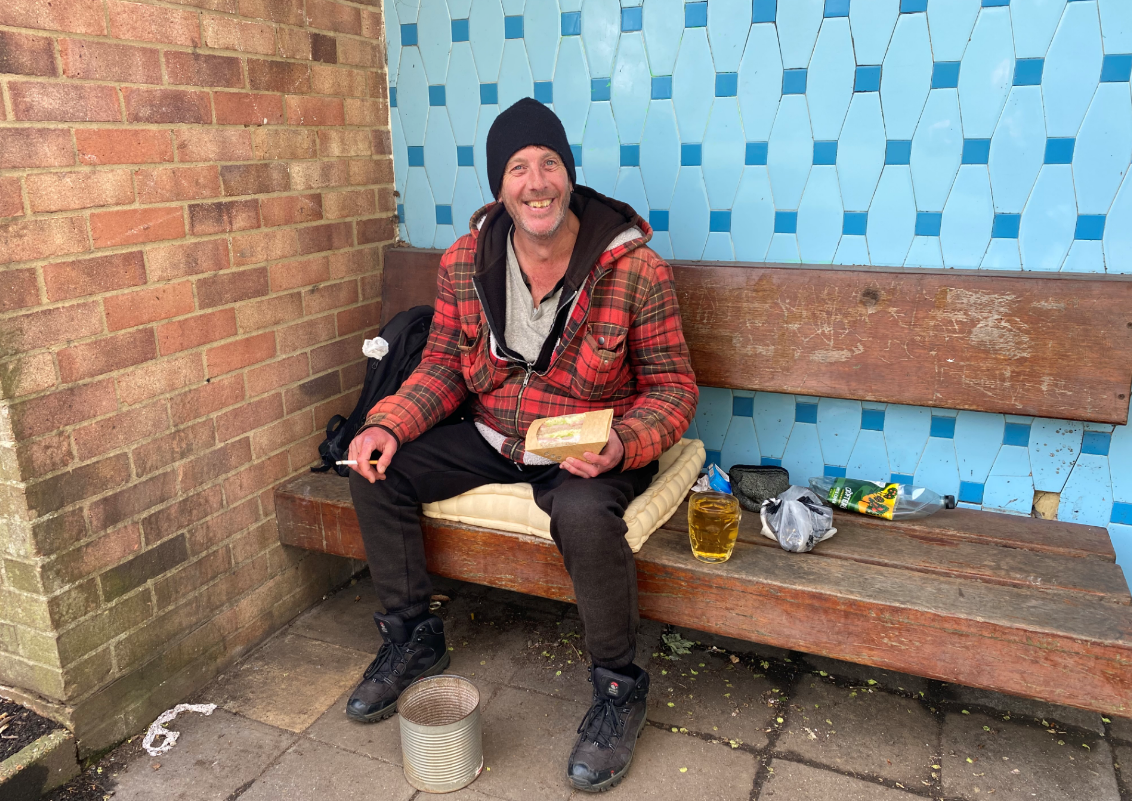







A valuable look behind the scenes, Joel!
Post-pandemic these hotels may well have a lost tourism industry economy forcing big decisions. If their newfound guests work out, so fears are allayed, I would hope this arrangement can be retained – along with the level of volunteering. Many jobs will disappear as will the furlough pay which no doubt helps more people feel able to volunteer.
Fingers crossed!
excellent article so proud of the volunteers and their enthusiasm, effort, commitment and dedication to keeping this running.
This could not be done without them…thank you all so so much ❤